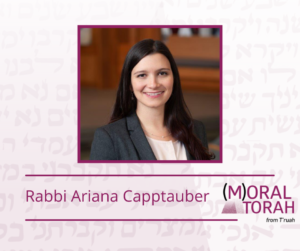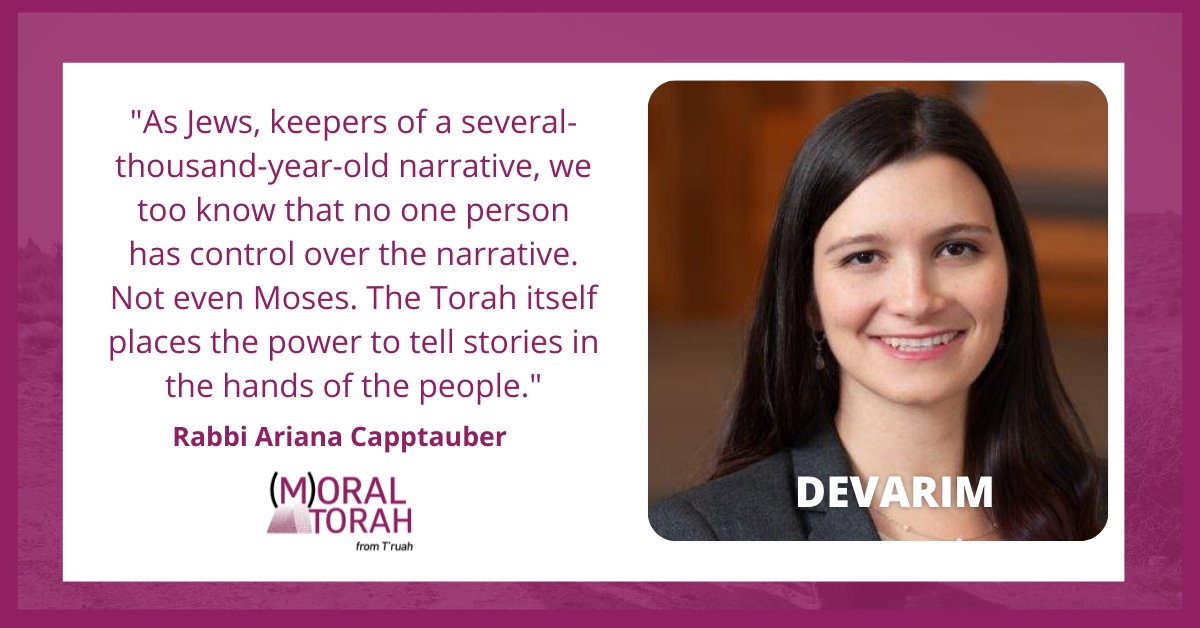A D’var Torah for Parshat Devarim by Rabbi Ariana Capptauber
“Who lives, who dies, who tells your story?” So sings the cast of Hamilton at the end of the play. His compatriots wonder: What will his legacy be? How will it be told? These questions resonate deeply as we all wonder, at times, what story will be told about us after we die. Lately, those questions have been debated on a national level, too, as people argue over what story will be told about the United States.
At the opening of the book of Deuteronomy, Moses worries about who will tell his story and the story of his people. Standing atop the last mountain he will ever climb, before those who will survive him and enter the promised land, Moses recounts a version of the story of the Israelite journey from slavery to freedom, which is also the story of his life.
But something is amiss in his telling. Moses begins the story in medias res, cuts out major swaths of the history, and zooms in on others. For example, he begins the story as the Israelites are about to leave Mount Sinai, thereby excising parts of the story that seem somewhat important – the plagues, the Exodus, and the giving of the Torah.
Sign up to receive (M)oral Torah in your inbox each week.
Rather than spend time on these paltry details, Moses jumps right to the one that weighs heaviest on his heart: Israel’s endless, burdensome complaining. He tells the story in fits and starts, mostly focused on the great difficulty he had leading the Israelites through the desert. We seem to be witnessing Moses’ long-awaited venting session. Deuteronomic history is told through the lens of 40 years of built-up anger.
The classical commentators each analyze the discrepancies their own way, offering theories to explain Moses’ choices, but to me they all miss a central point. They assume that Moses has an iron grip on the telling of this story, shaping history the way he wants it remembered. But that is not the case.
The Torah installs a protection against a monopolized telling of this most important story. Several times in Exodus (12:26, 13:8, 13:14), and again in Deuteronomy (6:20), the Israelites are reminded, even commanded, to tell the story themselves. In each generation, the Israelites must tell the story of the Exodus, each at their own table, to their own children. This multiplicitous storytelling protects against the tyranny of a single narrative. If one person tells of the Exodus this way, surely another will tell it that way. And so the Torah ensures that the multiple truths of experience are preserved.
Today a fierce battle rages over the telling of American history. Politicians on either side of the political spectrum are fighting to control the historical narrative taught to children in schools. Is the story of America one of heroic struggle and benevolent, exceptional rule? Or is it a story of a colonizing power that exploited, oppressed, and exterminated non-white peoples? Like Moses, politicians want to use their position of power to model the narrative after their own motives. Like Moses, they are speaking mostly from a place of anger.
Find more commentaries on Parshat Devarim.
Perhaps they would all be served by listening to the words of George Washington as told by Lin-Manuel Miranda: “Let me tell you what I wish I’d known/ When I was young and dreamed of glory/ You have no control/ Who lives, who dies, who tells your story.”
As Jews, keepers of a several-thousand-year-old narrative, we too know that no one person has control over the narrative. Not even Moses. The Torah itself places the power to tell stories in the hands of the people. Seen from a bird’s-eye view the story may appear to contain a single narrative, but seen up close one can tell that it is, in fact, atomized into the millions of perspectives, the millions of retellings, of every Israelite, every Jew.
This truth is codified in the midrashic literature, in which the rabbis expand upon, argue over, and ultimately retell almost every story in the bible in their own voice. It is encapsulated in the publications of hundreds and thousands of haggadot over the ages, each telling the story of the Exodus in its own words. It is practiced annually in each of our homes, as we tell the Passover story at the seder, encasing the narrative in the confines of each of our own homes, infusing it with the flavors of our family tables. When Moses spoke to the Israelites on that mountain top, he might have thought that he was determining the story to be told for generations to come; but if he did, he totally misunderstood the people before whom he stood.
As the battle over our American historical narrative rages in state houses and on news channels and in the Twittersphere, we must reclaim our responsibility to each teach the stories and perspectives we know to be true. We must teach the truths of our own people who immigrated to this country, who face antisemitism, who march for justice. We must teach the truths of those living in structures of racism, carrying the traumas and cruelty their ancestors endured in this land. We can also tell stories of glory, of resilience, of beautiful, unlikely partnerships, and of long arcs bending toward justice.
 Who will tell our story? We will. It is up to each of us to teach our children, to teach the next generation and the one after that, over tables and dinners in classrooms of our own making. As Deuteronomy reminds us, the thing is close to us, in our hearts and in our mouths, to tell it. It is up to us: the story lies in our hands.
Who will tell our story? We will. It is up to each of us to teach our children, to teach the next generation and the one after that, over tables and dinners in classrooms of our own making. As Deuteronomy reminds us, the thing is close to us, in our hearts and in our mouths, to tell it. It is up to us: the story lies in our hands.
Ariana Capptauber serves as the rabbi of Beth El Temple in Harrisburg, PA. She is an alumna of the T’ruah summer fellowship and was ordained at JTS in 2020.

